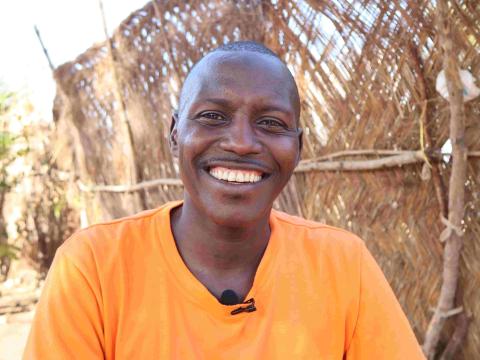A Teacher’s Resilience: Isa’s Mission to Provide Refugee Children with Learning Amidst Sudan Crisis

The ongoing crisis in Sudan has had a significant impact on many women and children. Families have been forced to leave their homes in search of safety in neighbouring countries, such as South Sudan. Many schools have been destroyed, leaving both students and teachers displaced. Many of these individuals are now living in refugee camps that lack educational facilities and educators. Fortunately, some refugee teachers, like Isa Muhamad, 41, continue to pursue their passion for teaching by providing displaced children with the opportunity to continue their education and keep their dreams alive.
Isa was a dedicated teacher at a government school and also ran his own primary school in Darfur, Sudan. He loved teaching and helping children learn. He had a lovely family. His seven children—two boys and five girls—enjoyed a peaceful life full of joy and laughter. But everything changed when the crisis hit Zalingei, the capital of Central Darfur, leaving him with no choice but to flee for safety. Together with his second wife and four children, they left their home, hoping to find safety and education for their children in South Sudan.
They arrived at the Wedweil Refugee Settlement with just their clothes. Isa and his family had no beds, kitchenware, or sheets. It was a desperate time for them. World Vision, with funding from UNHCR, came to support them by providing essential items such as blankets, cooking sets, clothes, and soaps. The World Food Programme (WFP) also provided them with food, which made life a little easier. This support changed everything for Isa's family. They were able to set up a temporary space to live.
As days went by, Isa noticed that there were no schools or any learning facilities for children inside the camp. Many parents, like himself, were concerned about how to feed their children and where they would learn. Isa wanted to help. He decided to open a community school called Al Mustagbal Primary School with the help of the UNHCR and other humanitarian organisations. Al Mustagbal means the future. The school started with only classes from primary one to primary four. The school initially offered classes from primary one to four.
Realising that there were more children needing to learn, UNHCR arranged for three nearby government schools—Salvation Primary School, Wedweil Primary School, and Old Wedwil Primary and Secondary school—in the host community to accept refugee children. In these schools, World Vision, with funding from UNHCR, provides training for both government and refugee teachers and PTA members. Additionally, they distributed teaching and learning materials for over 250 refugee children, including exercise books and pens, and payment of registration fees for refugee learners.
To ensure schools are managed well, World Vision established and trained groups like the Teacher-Parents Association, Hygiene, Sports & Drama, and Girls and Child Rights Clubs. Today, there are over 442 refugee children registered in these integrated schools. Isa is now one of the 13 refugee volunteers teaching at Wedweil Integrated Primary School. He receives incentives from UNHCR for his hard work.
Isa proudly says, “These schools are not only centres of teaching and learning. They are pillars of peaceful coexistence between us (refugees) and our brothers and sisters in the host community.” Refugee children are now learning together with children in the host community. They are starting to speak some basic English and Dinka languages.
Isa’s family also feels the difference. He says that, at first, they could only have one meal a day. But now, with the incentive from UNHCR, they can enjoy three meals a day. "My family can now have three meals a day instead of just one. This has made a big difference in our lives. It makes us feel more secure and healthy," Isa shared.
Isa’s story is a powerful example of hope and resilience. Even when faced with challenges, he found a way to help others and create a brighter future for the children in his community.
Story and photos by Moses Sakondo, Communication Officer